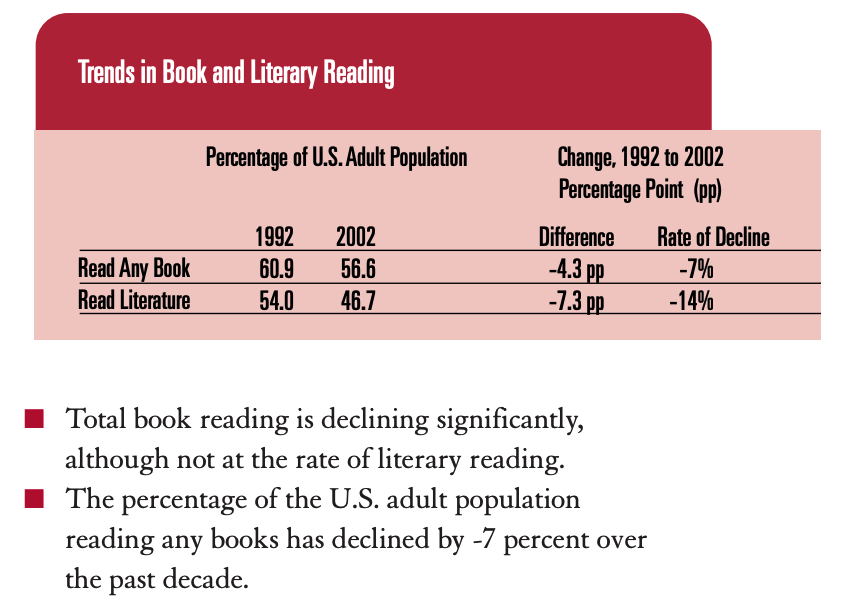A recent National Endowment for the Arts survey found that the percentage of adults who reported reading books declined over the past decade. Over 50% of Americans didn’t read a book in 2022. Furthermore, 22.01% of adults haven’t read a book in over 3 years, and 10.83% haven’t read a book in more than 10 years.
 In 2022, Americans read an average of 12.6 books, fewer than in any previous Gallup survey since 1990. The amount of time spent reading for personal interest per day has significantly decreased, from 0.36 hours to 0.29 hours. The percentage of adults who read literature, such as novels, short stories, poetry, and plays, has decreased from 45.2% in 2012 to 37.6% in 2022. The decline in reading is especially noticeable amongst women, college graduates, and older Americans. Today, the average US woman reads four fewer books, from 19.3 to 15.7. College graduates dropped from 21.1 books to 14.6 in 2021. Americans today only read 17 minutes daily compared to watching 3 hours of TV.
In 2022, Americans read an average of 12.6 books, fewer than in any previous Gallup survey since 1990. The amount of time spent reading for personal interest per day has significantly decreased, from 0.36 hours to 0.29 hours. The percentage of adults who read literature, such as novels, short stories, poetry, and plays, has decreased from 45.2% in 2012 to 37.6% in 2022. The decline in reading is especially noticeable amongst women, college graduates, and older Americans. Today, the average US woman reads four fewer books, from 19.3 to 15.7. College graduates dropped from 21.1 books to 14.6 in 2021. Americans today only read 17 minutes daily compared to watching 3 hours of TV.
With the advent of the internet, smartphones, video games, and social media, people tend to be more occupied with related activities than reading books.
 Attention spans have also declined significantly. Addiction to phones and social media is likely a big part of why younger people aren’t reading as much. TV also contributes to this declining habit, exacerbated by free video hosting platforms like YouTube and social media channels. People also binge-watch content on platforms like Netflix, Amazon Prime, Apple TV, Hulu, etc. Some of the other professed reasons are:
Attention spans have also declined significantly. Addiction to phones and social media is likely a big part of why younger people aren’t reading as much. TV also contributes to this declining habit, exacerbated by free video hosting platforms like YouTube and social media channels. People also binge-watch content on platforms like Netflix, Amazon Prime, Apple TV, Hulu, etc. Some of the other professed reasons are:
- Book cost
- Decline in Public Library use
- Reduced number of physical bookstores
- Not making reading a goal or habit.
Of all the above reasons, “not making reading a goal or habit” is the one parents have the most control over. Here are a few suggestions that might work for you and your family. Set a goal to read a certain number of books within a certain time, say, 12 books a year.
You don’t have to wait until the new year to set up such a goal; it can be done at any time, and the sooner, the better! Modeling regular reading behaviors is very powerful. If you have very young children, make sure to read them a story or a few pages from a book every day. Children will also respond to seeing their parents read often. Plan and set up a reading time for the whole family, starting with 20-30 minutes. After dinner and before bed is an excellent opportunity to ensure all family members are off technological devices and decompressing with literature. Congratulations to our newest Afficient Stars, who achieved High-Honors and Honors status last week! If you are reading aloud to your child, be sure to embed time to check your child’s reading comprehension skills by asking them questions and discussing the events in the book. Follow a one-book rule. Start one book, read it cover to cover, and then move on to the next one. This will give children a sense of accomplishment and motivate them to pick another book. According to the same survey, 28.76% of people never finish a book they start reading, but those who finish one book are 29.02 times more likely to read at least one more. Schedule a time to visit your local library weekly with your child or family. This is a valuable ritual that teaches children how to pick their own books and discover new genres of literature. Reading regularly has countless benefits. It’s a habit that, if developed and practiced well, will help at every stage of life.
Learn more about Afficient’s AI-driven English Language & Arts program Afficient English for students in K-12.






Leave A Comment